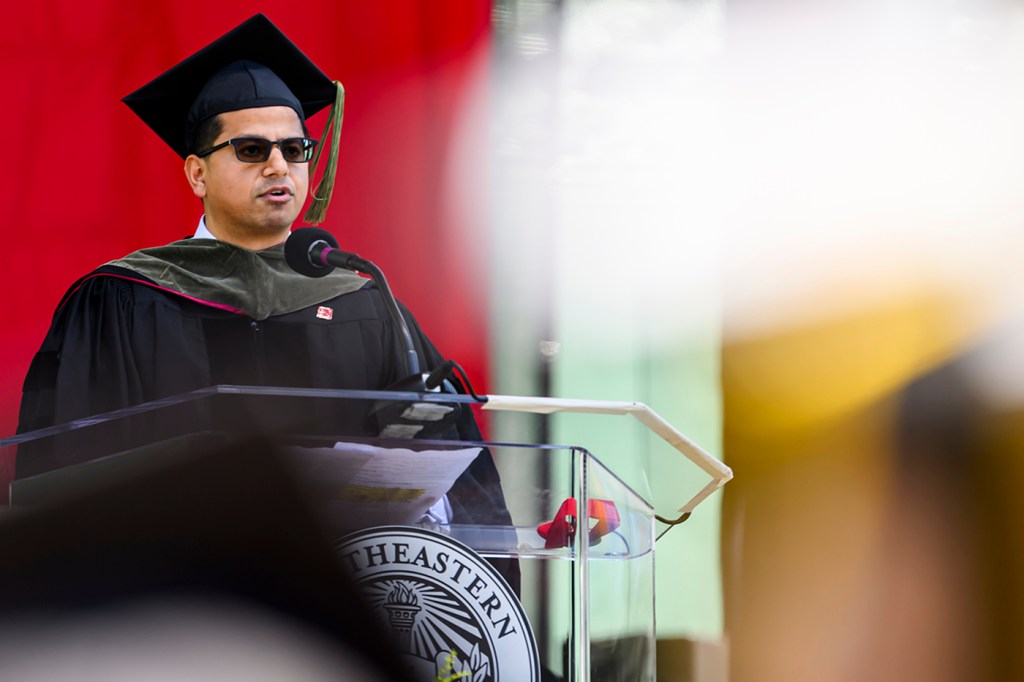Intellectual curiosity a driving force in his career. Double Husky lives in two worlds: the lab and the law

Following up a doctor of pharmacy degree with a law degree may be out of the ordinary, but for Northeastern University graduate Paresh Kumar it was a natural progression.
Kumar wanted to get cutting edge medical advances out of the lab and into bedside treatments.
“I realized that as a pharmacist, I could certainly help patients day to day,” Kumar said.
“But if, as a lawyer, I started helping companies develop their novel therapeutics, my work could impact millions, possibly billions, of people in my lifetime,” Kumar said.
A double Husky, Kumar received a bachelor of science degree in pharmacy from Northeastern followed by a doctor of pharmacy degree, also from Northeastern, in 2014. He went on to obtain a Juris Doctor degree from Boston University in 2018.
“I’m definitely a specialist,” Kumar says. “I’m a life sciences attorney specializing in intellectual property transactions, and a registered patent attorney.”
“Even though that’s a niche area of practice, the biopharmaceutical industry is quite large and just about every biopharmaceutical company needs my expertise at some point– whether it’s the first foundational license, scientific collaborations along the way, buying or selling drug programs, or engaging various kinds of corporate activities that impact these companies’ most valuable asset, their intellectual property.”
At Northeastern, Kumar learned the intricacies of biology, microbiology, pharmaceutics, pharmacology and medicinal chemistry along with clinical disease management, on top of which he layered the legal skills he learned in law school and while practicing law.
“I rely on my scientific knowledge and clinical training in advising clients through the research and development process and ultimately the commercialization of products,” he says.
“It starts, most of the time, in the academic world, where you have your brilliant professors doing the early stage research through various grants and other sources of scientific funding.”
“At some point, that technology will pass or fail proof of concept studies in animal models – it’s best to figure that out as soon as possible,” says Kumar.
“Given the capital intensive nature of drug development, the cutting edge technology needs to eventually be in hands of biopharmaceutical companies so the resulting products can be further developed and tested through clinical trials in compliance with the FDA’s regulations,” he says.
The technology or product “doesn’t help anybody if it sits in the lab forever,” Kumar says.
While a pharmacy student at Northeastern, Kumar says he minored in law and public policy.
“For my last class for my minor, I had professor Michael Dukakis,” the former governor of Massachusetts who is now professor emeritus.
“He was definitely an influential figure” and held the class spellbound, “with discussions of the origins of our modern healthcare system and the underlying laws and policies driving it at the federal and state levels, and the role that pharmaceutical innovation plays within that complex system,” Kumar says.
“Being in his classroom, I got the inescapable feeling that I had to do more, and pursue formal legal training, which is what I did,” says Kumar, who adds that Northeastern fueled his interest in entrepreneurship and drug development through the university’s Health Science Entrepreneurship program.
Working with pharmaceutical companies and startups has given him a ringside seat at the development of all kinds of cutting edge therapeutics including gene and cell-based therapies, he says.
“It’s the very frontier of modern medicine, and it’s very important.”
Intellectual curiosity has been a driving force in Kumar’s career.
“You need to have this internal curiosity that drives you to understand the world around you,” he says.
“My pharmacy degree provides a strong scientific foundation, all the way from bench to bedside. When I got my law degree, it opened my eyes to a whole new world. I started to understand how our government works and how our modern society is framed through various laws and policies over the years. It drove me to find my niche and specialty, which sits at the intersection of science, business and law.”
Cynthia McCormick Hibbert is a Northeastern Global News reporter. Email her at c.hibbert@northeastern.edu or contact her on Twitter @HibbertCynthia.






